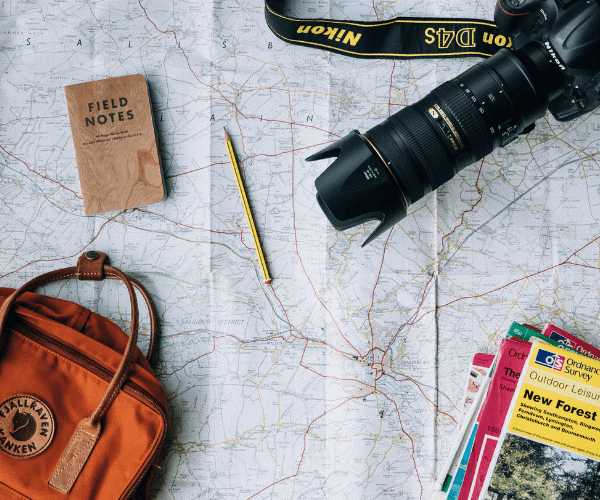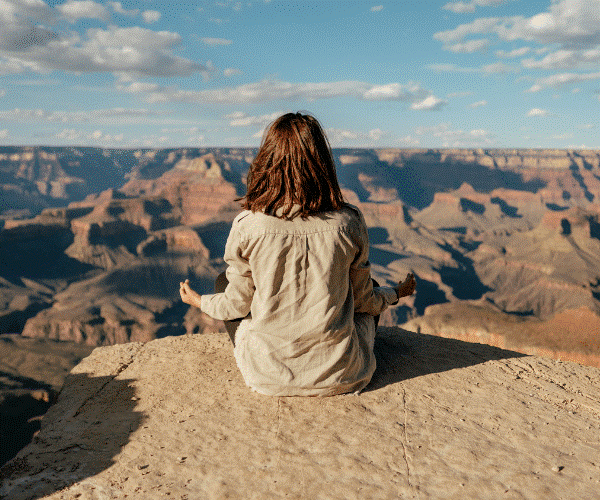Top tips for combatting travel anxiety (from a frequent flyer)
We all know the mixture of fear and excitement when visiting a new, unfamiliar place. But sometimes the stress of travel plans can lead to travel anxiety. Although this isn’t an officially diagnosed mental condition, for certain people, anxiety about traveling can become severe, and may even stop them from going on a well-deserved vacation, or that promising business trip.

Read some of the common triggers of travel anxiety and my go-to tips for overcoming it.
What causes anxiety about travel?
People can develop negative associations with travel from a variety of experiences. One study revealed that 65% of people who’d been in a major car accident developed travel anxiety. Anxiety disorders are the most common mental illness – affecting 40 million adults each year in the United States alone.
Having a panic attack while in an unfamiliar area can also lead to anxiety over traveling. Simply hearing about negative travel experiences, like plane crashes or foreign illnesses, can cause anxiety to spike in some people. Of course, anxiety disorders can also be caused by biological risk factors – with some research indicating strong genetic links for developing anxiety in young adulthood and beyond.
Feeling anxious before you travel is entirely normal. Scratch that; anxiety is completely normal. It’s our body’s natural response to stress. Thankfully there are some things you can do to help you better manage your anxiety levels before you head to the airport.
Identify your triggers
Anxiety triggers are things that lead to an increase in your anxiety symptoms. These triggers could be specific to traveling – like planning for a trip or flying. They may also include outside factors like low blood sugar, caffeine, or stress.
Pay attention to what seems to be triggering you and then you can start to work through them with healthy coping mechanisms. This might be your sign to consider therapy with a psychologist or counselor to help you identify your triggers and start living a less anxiety-inducing life.
Plan for certain scenarios
Many times, it’s those pesky “what-if’s” that set us off. And while we can’t plan for all the worst-case scenarios in the book, you can plan for many of them. For instance, “What if I get lost?” Well, you can always keep an offline map on your phone or guidebook on hand to make sure you can find your way back even if you have no WiFi or mobile devices available.

Here are some of the more common ones:
- What if I run out of money? I can always contact a relative or friend. I can bring a credit card for emergencies.
- What if I get lost? I can keep a paper map or guide book and my phone with me.
- What if I get sick while on the trip? I can purchase travel health insurance before I leave or be sure my insurance will cover me.
By preparing for worst-case scenarios ahead of time, you’ll see that most problems have a solution, even when you’re not close to home.
Plan for responsibilities at home while you’re away
For some people, the thought of leaving home is what causes the most anxiety. Leaving the house, kids, or pets can cause extreme anxiety. But just like planning ahead for your trip, planning for whilst you’ll be away from home can help ease those concerns.
If you need to, hire a house sitter or ask a friend you trust to stay at your place to help look after the plants, pets, or any other affairs while you’re away. A good sitter will provide you with regular updates while you’re away so you can feel like everything’s in good hands while you’re gone.
Bring plenty of distractions
What’s your go-to activity that helps reduce your anxiety? For some people, video games and movies offer a visual distraction to pass time. While others find comfort in quieter activities like reading books or doing puzzles.
Whatever your distraction is, consider bringing it along for the ride. Enjoyable distractions can help keep negative thoughts and feeling at bay, giving you something positive to focus on instead.
Come back to your body
Anyone who suffers from anxiety can tell you that anxiety isn’t just in your head. And you can mitigate your anxiety by tending to your body:
- The night before your travels, drink plenty of water and nourish your body. Anxiety can diminish your appetite, but the brain and body need fuel to combat anxiety.
- Make sure you have plenty of water to stay hydrated since thirst increases due to anxiety.
- When you’re at the boarding gate or in your seat, do a 10-minute meditation with some calming music to help clear your thoughts.
- When you’re in your seat, make sure you have something to read or watch, or even just saying the alphabet backwards will give your brain a task to focus on.
- Practice compassionate and encouraging self-talk. Say to yourself, “I can do this. I am safe.”
While traveling, it’s also important to be thoughtful about food choices. The foods we put into our bodies can directly affect our ability to regulate out moods, including the amount of anxiety we feel. Be mindful of caffeine, sugar, and alcohol intake when trying to manage anxiety.
Practice relaxation
Actively relaxing is one of the most important ways to teach your brain to manage anxiety and reduce your stress levels. So even if you decide to pass on the distractions, try out some deep breathing exercises or close your eyes for a quick five-minute meditation to center yourself and your thoughts.

Research shows that mindful meditation can help to significantly reduce anxiety symptoms. Breathe deeply, relax your muscles, and try to ground yourself.
Consider medication
If therapy, preplanning, and distractions are enough to help, medication is an option to explore – even if it’s not long-term. Benzodiazepines and antidepressants are two types of medication that are commonly prescribed to people suffering from anxiety. Studies found that selective serotonin reuptake inhibitors (SSRIs) are most effective for long-term anxiety treatment.
In the case of a panic attack while traveling, a benzodiazepine like lorazepam can provide short-term, immediate relief.
Find the positives in traveling
Traveling is a popular activity, and exploring new experiences, cultures, and cuisines is an incredible way to widen your worldview.
IMPORTANT NOTICE:
If you are reading this article anywhere other than on A Luxury Travel Blog, then the chances are that this content has been stolen without permission.
Please make a note of the web address above and contact A Luxury Travel Blog to advise them of this issue.
Thank you for your help in combatting content theft.
Before your trip, it may be helpful to write down all the positive experiences you hope to get from traveling. Keep this list with you as you travel and refer to it during moments of anxiety.
Ultimately, vacations give you a chance to change your habits. Try to view this as an opportunity to reinvent yourself and simply enjoy the fact that you’re out of your day-to-day routines and away from everyday life.
If you have travel anxiety, you may find it difficult to participate in or enjoy traveling. Before a trip, mindful preparation can help reduce your negative thoughts on traveling.
During the trip, mindfulness, distractions, and even medication are all options you can explore to reduce your travel anxiety. Make sure you set your own pace and take each leg of the journey, and itinerary items as they come.
Did you enjoy this article?
Receive similar content direct to your inbox.



If you’re flying my tip is to take a look at the In-flight entertainment. If you are a nervous flyer like me having some films to look forward to can be a good distraction.
One way to reduce the anxiety is to get proper sleep. I usually feel anxious when I’m overtired.
It’s encouraging to see travel anxiety getting some serious and thoughtful attention. I think there’s more of us suffer from it than is generally thought.
Absolutely! And I think it has increased since the Covid era for sure
I used to be a terrible traveller which was bad news. As I rose up the corporate ladder I had to travel more and more – which I came to hate. Standing back and taking a long hard look at the problem I decided that I needed an incremental approach, changing lots of little things. I took on diet, mindset, time management sleep, hydration etc. Actually managing lots of little things slowly led to a feeling that I had more control. It was time-consuming and it wasn’t easy. Nor have I eliminated my anxiety problem but it is significantly reduced.
I’m sat in departures at Heathrow waiting for my departure gate to be announced. I came across this and found a lot of useful info here.
The thing is that for some of us a lot of our travel is for business. On the one hand much of the organisation and booking is done for me which takes out a lot of the unknowns.
The thing with business is that not only does everything have to happen on time you also have to achieve your objectives too which adds to the anxiety.
Have you got any tips for business travel. Perhaps that could be another post for another day?
Money. That’s what causes me anxiety while traveling. Spending too much of it. All the unexpected expenses. That’s not really something that can be helped. I think the anxiety isn’t as bad at the moment as it is when I get home. What a way to end a trip!